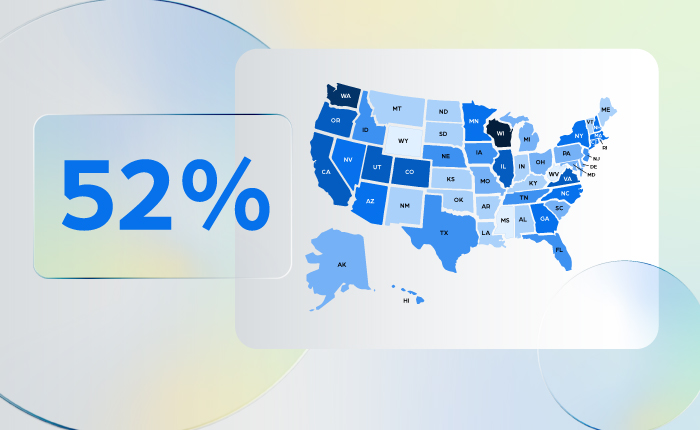The landscape of data security and privacy is constantly changing. With a Gartner survey revealing that almost half of organizations with more than 11 marketing channels are increasing first-party customer data collection,2 it’s vital that consumers understand the importance of protecting their personal information.
With the prevalence of data leaks and security breaches in the media, it’s understandable that Americans’ concerns are rising. Businesses are aware of the issues of balancing customer value and privacy, with 60% of marketing leaders believing it would be more challenging in 2023.2
We conducted a survey to examine exactly how these fears are manifesting and what actions are being taken as a result. Here’s our report on the rising concern for data privacy among American consumers.
The data privacy concerns of Americans
People in the U.S. are highly concerned about the privacy and security of their online personal data. Results from a recent USA TODAY Blueprint survey show that the majority of Americans are concerned about how their data is used1 — here’s our analysis of the responses.
84% of Americans are concerned about the security and privacy of their personal data online
In our survey, 84% of American respondents were either somewhat or very concerned about the security and privacy of their personal data online, as well as the amount of personal data businesses are collecting.1 This highlights the need to repair the broken trust between businesses and consumers.
Indeed, 79% of Americans say they are somewhat or very concerned about the way businesses use their personal data.1 Given the recent rise of artificial intelligence (AI) technology and its prevalence in everyday life, it’s no wonder that three-quarters of our survey’s respondents said they were somewhat or very concerned about the increasing use of AI in businesses.1
A reason for this is a lack of full understanding of what businesses actually do with the personal data they collect. Only around a quarter (26%) of Americans feel they understand very well and know the full details about how their data is used by businesses, and slightly more (27%) report having little or no understanding at all.1
80% of Americans are concerned that businesses are collecting data to target children with personalized advertising
Four in five Americans (80%) are somewhat or very concerned about businesses collecting data to target children with personalized ads.1 Over half of all respondents (53%) said they were very concerned about this — more than any other factor — showing how highly Americans value data privacy, particularly for their children.1
Gaming is of particular concern for parents. With the popularity of online video games unlikely to go away any time soon, the constant online presence is giving American parents cause to worry, with 77% concerned that these games are tracking their children’s online activities.1
74% of Americans feel the government is failing to protect their personal data online
Americans do not believe that the current U.S. government is doing enough to combat concerns around data security and privacy, with almost four in five (79%) concerned about the lack of punishment for brands that violate privacy laws.1
Most respondents to our survey also believe the government is failing to enforce existing privacy laws (76%), while 74% say the government is not effective in protecting personal data with privacy laws or safeguarding children’s online privacy and safety.1
Over 60% of our respondents believe that the government is failing to punish brands that violate privacy laws, enforce existing privacy laws, protect children’s online privacy and safety and protect personal data with privacy laws and regulations.1
32% of Americans don’t trust businesses to use their personal data ethically
Almost a third of Americans are distrusting of the way businesses use their personal data — 32% don’t trust businesses to use their data ethically, or in only the way it was originally intended and agreed upon.1
Even more don’t trust that businesses will not share their personal data without permission (37%), and the majority of Americans (69%) said they’d be likely to shop elsewhere if they disagreed with a business’s data privacy terms.1 This only serves to highlight the growing importance of businesses needing to reestablish trust for their consumers.
Over half of Americans would be more willing to share their data if businesses made these changes
A significant stumbling block for businesses regarding overcoming challenges related to balancing privacy and customer value is transparency about the process rather than the collection of data itself.
For example, the majority of Americans would be more willing to share their data if:1
- Businesses were more upfront about how it would be used (60%).
- They had a clearer understanding of the benefits of sharing data (63%).
- AI wasn’t involved in the process at all (53%).
42% of our survey respondents would be more likely to share their data with brands if they advocated for and practiced data privacy.1 This is far more of a driving factor than others, with only a quarter saying they’d be more likely to share data to improve AI products and services. A mere 17% said they would be more likely to share data to receive personalized ads and offers.1
What does this mean for businesses? In the current landscape, it’s clear that changes need to be made to gain more consumer trust. Data collection can be vital for brands, and Americans would like to see these businesses enhance data security and protection measures more than anything else (52%).1
Among other changes Americans would like to see in terms of data privacy and security are:1
- More control over what data is collected and how it’s used (48%).
- Increased transparency about how the data is used (44%).
- Clearer communication about their rights concerning their data (40%).
Here’s how businesses can implement some of these changes:
- Invest more in cybersecurity measures and technologies like encryptions and firewalls, and keep your systems up-to-date to ensure you’re protected against new threats.
- Allow users more control over data collection and usage with options to view and request the deletion of data.
- Provide more transparency and communication about data usage and rights for your customers.
- Develop a detailed and thorough response plan for data breaches and ensure all staff are adequately trained for these procedures.
- Consult external third-party security experts for audits and assessments regularly to help identify vulnerabilities and recommend improvements.
27% of Americans don’t trust the biggest brands in the U.S.
Over a quarter of Americans say they don’t trust the biggest brands in the U.S. with their personal data.1 Among major brands, the most trusted is Amazon, with almost half of all respondents (49%) saying so. It came ahead of Google (35%), Apple (31%) and Walmart (25%).1
Interestingly, the brands that consumers trust least include Tesla (4%), Snapchat (7%) and Starbucks (8%).1
Predictably, there are generational splits across businesses — particularly with social media, as each generation seems to have its preferred platform. Millennials trust Facebook more than any other platform, with almost a third (32%) saying so, compared to 19% trusting Instagram and 14% trusting TikTok.1
Conversely, Gen Z prefers Instagram (28%) to Facebook (23%) in terms of trust with data, though TikTok also comes last at 22%. Of our baby boomer respondents, 14% trusted Facebook, 4% trusted Instagram and 2% trusted TikTok.1
The industries Americans trust the most
On the topic of social media, as the previous figures suggest, Americans trust this industry the least with data. 37% of respondents say they feel social media platforms use their data unethically, significantly more than computer and technology businesses (25%), the entertainment industry (24%) and media and news (24%).1
Out of our respondents, 28% say they don’t trust any of the industries we listed, including healthcare, retail and e-commerce, security, food and beverage, hospitality and real estate, among others.1
It’s interesting to see how Americans working in particular sectors feel about their industries’ use of personal data. Figures suggest that insider knowledge on the part of workers in the computer and technology industry is the most revealing, with almost half (47%) of all those surveyed feeling that their own industry acts unethically with personal data.1
AI in data collection
While artificial intelligence is rapidly ascending and chatbots like ChatGPT take the spotlight, another practical use of this technology is becoming a concern to Americans. With AI’s progress seemingly unhindered, almost four in five Americans (79%) believe the U.S. government is not effectively regulating how businesses use it or restricting potentially harmful AI development.1
Additionally, around a third of Americans don’t trust businesses to make responsible decisions about AI, with 14% feeling very distrustful of this particular aspect.1 It’s the responsibility of businesses to ensure they act within boundaries and ethics, especially where AI and data collection is concerned.
Here are some tips on how to use artificial intelligence ethically:
- Establish ethical guidelines before getting started so you can create a framework for all actions going forward.
- Be transparent with users about the implementation of AI to ensure you can maintain trust with your customer base.
- Ensure you obtain explicit informed consent before using AI to collect data from users, allowing them the choice to opt in, opt out or withdraw consent.
- Regularly update and audit all AI systems to ensure they’re following your guidelines and to help you identify any potential issues.
70% of Americans have been a victim of cybercrime
Why is data security and privacy such a concern for Americans? Perhaps because the majority of our respondents (70%) have been a victim of some kind of cybercrime.1 This is enough to make anyone think twice about what their personal data is being used for whenever entering a phone number or email address online.
Around 42% of Americans have experienced fraudulent charges on their credit card, while over a third (35%) have had their social media accounts hacked and over a quarter (28%) have had one or more passwords leaked in a data breach.1
The data also suggests that different generations are susceptible to different threats. Half of all baby boomer respondents have experienced fraudulent credit card charges, while 44% of Millennials have had their social media accounts hacked. The most common instance of fraud for each age group is social media accounts being hacked.1
What steps do Americans take to protect their personal data?
There is a burden on American consumers to ensure they are following best practices and keeping their data safe. One way you can better understand what personal data you are handing over to a company is to read that company’s terms and conditions.
But more than nine in 10 Americans (91%) have agreed to terms and conditions — at least some of the time — without reading them.1 More concerningly, 19% of respondents do this all the time, while 27% do this often.1 This is more prevalent with Gen Z than any other age group, with 31% agreeing to terms and conditions without reading them all the time and 35% doing it often.1
It’s also important to keep good habits concerning your passwords. One thing to practice is ensuring you use different passwords for different accounts rather than putting all your eggs in one basket, so to speak. More Americans use different passwords for different accounts than any other option.1 However, an alarmingly high one-fifth of our respondents (20%) use the same password for most or all accounts.1
Despite being the more technology-aware age groups, Gen Z (29%) and Millennials (30%) are the ones who use the same password for most or all accounts the most. Only 11% of baby boomers do this, and only 6% of the Silent Generation (those born between 1925 and 1945).1
Another counterintuitive fact revealed by the survey was that almost a third (32%) of those working in the computer and technology sector use the same password for most or all of their accounts — second only to real estate workers (35%). A quarter of those working in the healthcare sector do this as well.1
On the whole, there are a number of ways users and consumers can protect their data. The most commonly undertaken best practices include:1
- Regularly checking financial statements and online accounts for unauthorized activity (41%).
- Using two-factor authentication (38%).
- Denying tracking permissions for mobile apps (37%).
Just over a fifth of all respondents regularly review and manage their app permissions on devices (21%) or use private browsing or incognito mode (21%) — and under a fifth (19%) go the extra step of using a VPN to ensure data privacy. Additionally, 8% of Americans take none of these steps.1
Baby boomers, according to our survey results, do more to protect their personal data than any other age group, with:1
- 47% denying tracking permissions on mobile apps.
- 56% regularly checking financial statements.
- 47% avoiding using public Wi-Fi for transactions or accessing sensitive information.
Generation Z are the least likely to check their privacy settings (21%), review and manage app permissions (20%) and turn off location tracking on mobile devices (25%).1 This could account for a more institutionalized and innate trust in technology on the part of younger generations compared to their older counterparts.
But how can Americans do more to improve their data security and protect their personal information? Here are some expert tips on keeping your data safe:
- Use a password manager to store passwords securely and generate unique passwords for different accounts.
- Don’t use public Wi-Fi when handling money or sensitive data, as these networks can often be vulnerable to cybercriminals.
- Keep your software up-to-date to ensure it has the latest protection from online threats and cybercriminal behavior.
- Limit data sharing with third parties and opt out when possible.
- Ensure you read privacy policies carefully so you’re aware of what you’re signing up for.
- Consider using a VPN to encrypt your internet connection and protect your online activity from being monitored.
Methodology
Sources
- USA TODAY Blueprint – Data privacy survey (conducted by Talker Research).
- Gartner – Gartner Survey Finds 60% of Marketing Leaders Believe Collecting Customer Data While Balancing Privacy and Customer Value Will Be More Challenging in 2023.
kgrounds, including self-published and traditionally published authors.



